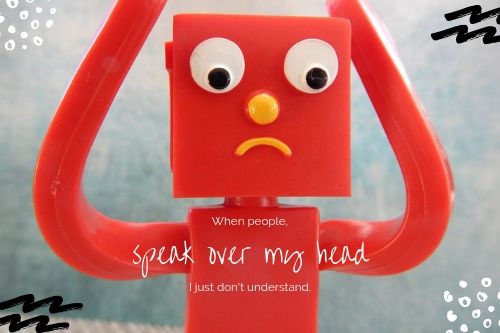
YouTube / iTunes / Spotify / Radio Public / Pocket Casts / Google Podcasts / Breaker / Overcast
Listen to ArtisanEnglish.jp posts & lesson intros here.
Phrase: Speak over your head
No one enjoys listening to someone who is speaking over their head.
It’s usually rude, and in some cases, it can discourage your listeners.
When a person speaks over your head, they talk about things which you cannot understand.
Often, when a speaker uses a lot of jargon or industry-specific language, people who are not familiar with that industry have difficulty following the conversation.
The listeners are unable to wrap their heads around the ideas and concepts which are discussed.
Financial advisors, government consultants or even medical doctors need to be aware of the language they use in a conversation.
If they are giving information to someone unfamiliar with their specialty, they must be careful not to speak over their heads.
One of the significant challenges with this is when we explain or teach new things.
There is a danger of speaking over the heads of the people we are trying to teach.
Situations like this arise all the time in the language classroom.
One major challenge is that the higher the student’s level, the more likely the topic will be over their heads.
For example, in beginner-level classes, lessons are often based on daily life situations.
Most people find themselves shopping at a convenience store, boarding a bus, or watching a weather forecast.
The situations are familiar even though the language may not be.
As the class level increases, the topics and situations discussed may be unfamiliar.
Topics such as cryptocurrency, retirement or environmental conservation may be unfamiliar to people in certain cultures.
For this reason, there is a risk that the teacher will discourage students by choosing material that is too difficult or speaking over their heads in the classroom.
L + 1 (The student’s level plus one level higher) is best.
The most appropriate new material is one level above the student’s ability.
It’s challenging but not discouraging.
Flesch-Kincaid Readability Test
This post is understandable by someone with at least a 9th-grade education (age 15).
On the Flesch-Kincaid reading-ease test, this post scores 55.
The higher the score on a scale of 0 – 100, the easier the passage is to read.

